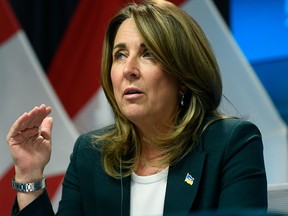Here’s the rewritten version of your text:
IMF Updates Growth Outlook to Reflect Emerging Risks
The International Monetary Fund (IMF) has revised its global growth outlook downward for the second consecutive year, signaling increasing concerns about economic stability. The updated projections highlight heightened risks across multiple sectors, including geopolitical tensions and inflationary pressures.
Key Highlights from the IMF’s Update
-
Global Growth Outlook:
The IMF now projects global growth to be 3.4% in 2023 compared to an earlier forecast of 3.7%. This adjustment reflects a broader assessment that emerging risks, particularly those related to inflation and economic policy, are likely to slow global growth. -
Regional Focus on Emerging Risks:
The revised outlook places a particular emphasis on regions like the U.S., where inflation is expected to remain elevated at 4.5% in 2023. This is driven by ongoing supply chain disruptions and tighter monetary policies, which are curbing economic activity. -
U.S. Economic Challenges:
The U.S. economy faces significant headwinds, including reduced household purchasing power due to inflation and higher interest rates. These factors have contributed to a projected decline in quarterly growth of 0.6%, the slowest since early 2021. -
China’s Economic Prospects:
China is expected to experience slower-than-expected growth, with its forecast revised downward from 5% to 3.7%. This adjustment stems from deeper property market imbalances and stricter COVID-19 restrictions that are curbing economic activity. -
Economic Policy Response:
The IMF cautions that the risks outlined in its April edition—such as a potential "sudden stop" of Russian gas supplies, inflationary pressures, and China’s property market crisis—are increasingly likely to materialize. These factors could lead to further declines in global growth. -
Implications for Emerging Economies:
The region is facing significant challenges, including rising energy costs, tighter monetary policies, and a weaker U.S. dollar. These factors are expected to make dollar-denominated debt more difficult to service, potentially leading to greater vulnerability among emerging economies. -
Policy Priorities for Central Banks:
The IMF emphasizes the importance of managing inflation while avoiding the risks of economic stagnation. This balance is particularly critical as central banks globally tighten monetary policies in response to elevated inflation and geopolitical instability. -
Global Spillover Effects:
The ongoing war in Ukraine, sanctions against Russia, and China’s property market crisis are expected to have significant global spillover effects, further complicating economic recovery efforts.
This revised outlook underscores the complex interplay of factors that will shape global economies in 2023. As the world navigates inflationary pressures and geopolitical uncertainties, careful management of economic policies becomes increasingly critical to mitigating potential risks and fostering sustainable growth.



